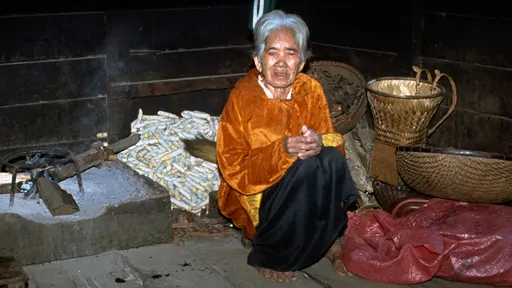Indigenous Calendar May, 2010: An Ede Khoa Sang

I'd been traveling through Vietnam for about a month. My journey from Nha Trang to Ho Chi Minh City would not be direct, like it is for most travelers. Instead I had decided to stop in Da Lat in Vietnam's Central Highlands. I'd heard about protest demonstrations by that area's indigenous population when I was in neighboring Cambodia, where many were fleeing as political asylum seekers. I was also aware of a media blackout policy in effect at the time so even going there was a little risky.
I was hoping to get a first-hand account of what had been happening. Of course I was careful about who I spoke to and what I said. But nobody in Da Lat seemed to have any idea what I was talking about. Some probably did know but considered it unwise to have any discussion with me.
I decided to rent a motorbike and go to the town that had been the location of the demonstrations, Buon Ma Thuot. The journey was risky for two reasons. First, the road was sand for almost the entire journey and, with very few communities along the way, I would have had a very long walk if I'd run out of gas. Second, few tourists go to Buon Ma Thuot and very rarely alone like I was. So my mere presence could have easily aroused suspicion. I was on my guard the whole time.
Using the town as my base I rode out to various surrounding villages. Most of these villages are inhabited by the Ede indigenous group. There are over two-hundred thousand Ede in this area. While it is almost impossible to find anyone with conversational English, some older Ede can speak French. It was through this common language that I was able to communicate.
I did not receive much information about the protest demonstrations — only confirmation that they were real and continuing. But I did learn a great deal about the Ede that I didn't know at the time would help me months and thousands of miles away when I tutored an Ede family in English after they had been relocated to the United States.
One of the things I learned was that the most elderly lady in each Ede family enjoys elevated status and prestige. She is known as the Khoa sang and she carries the most political authority of the whole family in decision making. I was unable to find out exactly how old this Khoa sang was — she herself didn't know. But I remember thinking how sad she must feel, having witnessed things like the introduction of electricity and literacy to her people, to be ending her days by seeing her people be driven away from their historical homeland.
The Ede are featured in our documentary, Indigenous Peoples of Southeast Asia.
If you enjoyed reading this article, please consider supporting independent, advertising-free journalism by buying us a coffee to help us cover the cost of hosting our web site. Please click on the link or scan the QR code. Thanks!


